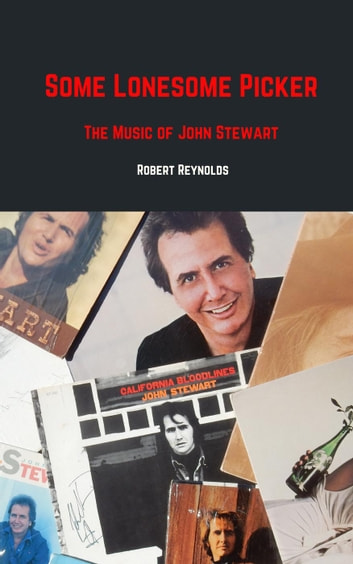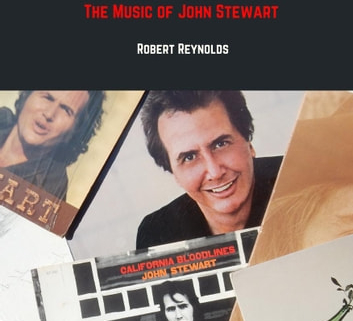ITS ALRIGHT ITS ONLY MUSIC: part 1 of John Stewart &The Bloodliners Festival.
ITS ALRIGHT ITS ONLY MUSIC
Fri 25 Jan 2008 23.46 GMT
It is thanks to the efforts of our volunteer staff and our constantly growing readership that Sidetracks And Detours has just turned on to the main highway of its thousand edition. We don´t need an excuse, ever, to run articles on the music of John Stewart and this milestone is as good an excuse as any to do so. Therefore all of our daily posts this week will look at different aspects of Stewart´s career. So many of John´s friends and fans, The Bloodliners, have ed loyal to his music, moved by it and responding to it, long after his death. I remember the first time I ever heard a John Stewart song peformed live, by Pete Benbow at The Kings Folk Club in Heywood. A couple of years later he and I travelled from Manchester to London to see John perform at The Bloomsbury Theatre. Its been around fifty years of sidetracking and detouring ever since, but it’s been a great ride all the way.

The writer Derek Schofield (left) posted his own profile on-line in 2015.
My first writings about folk music were in the early 1970s while I was at university in Manchester. I’ve not found them yet! My first article in a national folk music magazine was on the Lancashire singer, Harry Boardman, for Folk Review magazine in 1975 – see below. Since then I’ve written for English Dance & Song, Folk Music Journal, fRoots (and its predecessor Folk Roots), Folklore and The Guardian.
I’ll gradually be adding some of these articles over the forthcoming months, so please return to this site.
‘A Lancashire Mon – Harry Boardman in Interview with Derek Schofield’ (Folk Review, 4:6, April 1975). Read here.
‘”Christmas at Uttoxeter: The Guisers Made their Usual Tour'” (Folk Drama Studies Today: The International Traditional Drama Conference 2002 (Sheffield: Traditional Drama Research Group, 2013). Read here.
Folk Music Journal. I have written two articles for this journal:
‘”Revival of the Folk Dance: An Artistic Movement”: The Background to the Founding of The English Folk Dance Society in 1911’, Folk Music Journal, 5:2 (1986), 215-19.
‘Sowing the Seeds: Cecil Sharp and Charles Marson in Somerset in 1903’, Folk Music Journal, 8:4 (2004), 484-512.
These articles are available in the print editions, or through JSTOR.
Folk Music Journal. I have written two articles for this journal:
‘”Revival of the Folk Dance: An Artistic Movement”: The Background to the Founding of The English Folk Dance Society in 1911’, Folk Music Journal, 5:2 (1986), 215-19.
‘Sowing the Seeds: Cecil Sharp and Charles Marson in Somerset in 1903’, Folk Music Journal, 8:4 (2004), 484-512.
These articles are available in the print editions, or through JSTOR.
The Guardian. Over a number of years, I have been writing obituaries of folk musicians, singers, dancers and researchers for The Guardian. A link to the tributes going back to 2000 is available here:
http://www.theguardian.com/profile/derek-schofield
It was there we found Derek´s factual reporting of the death of John Stewart, previously thought of by many of my eneration as America´s Greatest Living Songwriter.
Writing in the Guardian at the time of the passing of the now long lamented singer-writer John Stewart wrote a factual tribute befitting of the artist, saying

Although he wrote more than 600 songs and recorded dozens of albums, John Stewart (right) , who has died aged 68 following a stroke, was best known for writing Daydream Believer, a smash hit for the Monkees on both sides of the Atlantic in 1967. But until 1967 he had been a member of the Kingston Trio, the clean-cut folk group that enjoyed international mainstream success from 1957 into the early 60s. Stewart joined the band – a missing link between the radical Weavers of the early 1950s and the early 60s folk boom – four years after they recorded Tom Dooley (1957), a US hit which made the British top five.

The young Stewart was inspired by the Kingston Trio (near right) , and while at college he formed the Cumberland Three (left) with Gil Robbins and John Montgomery. He was soon writing his own folk-style material and, when the Kingston Trio were playing in Los Angeles, Stewart offered them some of his songs, one of which, Molly Dee, made it on to their Here We Go Again album (1959).

The trio’s manager, Frank Werber, also facilitated the Cumberland Three’s recording career and in 1961, when the co-founder of the Kingston Trio Dave Guard left, Stewart replaced him, alongside Nick Reynolds and Bob Shane. A strong singer and instrumentalist, he brought considerable writing talents to the group, with whom he recorded a dozen albums, plus the US hit single Greenback Dollar.
Born in San Diego – in the same hospital where he died – Stewart grew up in the Californian cities of Pomona and Pasadena, where his Kentucky-born father was a horse trainer. He played guitar and banjo while at school and formed a band, the Furies, whose single Rockin’ Anna was a local success.
When the Kingston Trio disbanded, he began his solo career. His hit song Daydream Believer has been recorded by several other bands, including Atomic Kitten, Boyzone, the Four Tops and U2, and it has been used for eBay’s TV advertisements.
In 1968 Stewart supported Robert Kennedy’s ill-fated presidential bid, singing at campaign rallies. His first solo album was Signals Through the Glass, where he was partnered by Buffy Ford, who became his second wife in 1975. This album’s limited success was a prelude to his first solo album, California Bloodlines (1969), which was a seminal influence on the emerging Californian folk-rock scene, through the likes of Rick Nelson and later the Eagles. Rolling Stone magazine rated it among the 200 best albums of all time. With his love of US history and the novels of Jack Kerouac and John Steinbeck, plus the songs popularised through the folk revival, Stewart’s songs encapsulated a musical genre defined as Americana.
His next album, Willard (1970), also included James Taylor and Carole King. Stewart then switched from Capitol records to Warner, but two albums there failed to impress, and he turned to RCA. This was a classic period for folk and country-tinged singer-songwriters, but Stewart did not enjoy the popular success of Taylor, Joni Mitchell or Jackson Browne, let alone Bob Dylan. Studio recordings were not always as good as Stewart’s live performances which were captured on the double RCA album Phoenix Concerts (1974).
Then, in 1979, he released Bombs Away Dream Babies, with backing vocals and guitar accompaniment from Stevie Nicks and Lindsey Buckingham, of Fleetwood Mac. The song Gold from that album rose to number five in the American singles charts. The next LP, Dream Babies Go Hollywood (1980), failed to capture the same success, in spite of guest singers Linda Ronstadt and Phil Everly. After that, Stewart remained prolific, both in his songwriting and in the release of new albums – on average at least one a year – but recordings on his own label, Homecoming, did not enjoy wide distribution.
He visited England and Scotland, where a couple of live albums were recorded, and he wrote Turn of the Century, a song about the Princess of Wales. Alongside the new recordings, his back catalogue was eventually released on CD – one retrospective album was called Airdream Believer.

PHOTO 5 Rosanne Cash took Runaway Train to the top of the US charts, and Nanci Griffith duetted with Stewart on his song Sweet Dreams Will Come on her Little Love Affairs album. In earlier years, his songs had been recorded by Joan Baez (Strange Rivers) and Harry Belafonte (Missouri Birds), while Pat Boone recorded July, You’re a Woman as well as Never Goin’ Back, which was also covered by the Lovin’ Spoonful.
In recent years, Stewart performed with Reynolds at the annual Trio Fantasy camps in Arizona, where members of the audience could perform alongside the duo, and he entertained members of the Astronaut Hall of Fame at the Kennedy Space Centre. The early stages of Alzheimer’s disease prompted him to write I Don’t Drive Anymore.
Stewart is survived by Buffy, their son, and three children from his first marriage.
· John Coburn Stewart, songwriter and singer, born September 5 1939; died January 19 2008

COVER




Leave a Reply
Want to join the discussion?Feel free to contribute!